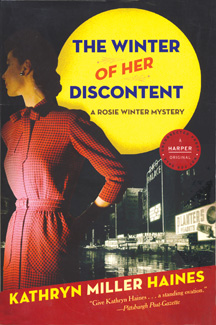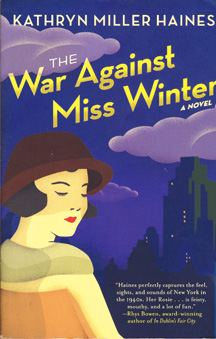The War According to Ms. Haines
Pitt staffer Kathryn Miller Haines’ novels unravel sentimentality about 1940s

Kathryn Miller Haines
When the war was over, I’d probably look back at the sacrifices I made and see them for how small they really were, but right now, in the fray, every one of us needed something forbidden, not because we were greedy pigs who didn’t care about our boys abroad but because we needed to be reminded of how normal life once was. (Rosie Winter in The Winter of Her Discontent)
If you imagine 1943 as a time when people blissfully sacrificed comfort for victory, then Rosie Winter will set you straight. Keep your ration stamps and dim-outs—she just wants a good steak and a decent man to chew it with.
A sharp New York “dame” with a blunted acting career, Rosie is the fictional star of a mystery series by Pitt staffer Kathryn Miller Haines, associate director of the Center for American Music. In the books, Rosie passes the time between stalled productions and the next ration by unraveling murders.
Haines, whose second Rosie Winter book, The Winter of Her Discontent (Harper), was published in June, is working on the third installment of the well-received series that once seemed impossible.
A longtime actress and a playwright, Haines began her writing career with a stalled Master of Fine Arts thesis. After receiving that degree from Pitt in 1998, she spent two years chopping and shopping her would-be book. As the rejection letters mounted, Haines realized that her (very long) book had a twisted and confusing plot that changed each time she revised it.
Haines, in a recent interview, attributed the plot problems to her background as a playwright: “Playwrights learn to focus on dialogue and let the director handle everything else,” she said. “I really had to push myself to write narrative description, but I wasn’t ready to give up on writing yet. This is really what I want to do.”
The two genres, plays and novels, are worlds apart, said Haines. In writing for the stage, Haines develops the story, sets the scene, and writes the dialogue. The plot moves along with the help of actors and directors. And nuances, such as mood and what characters look like, audience members can see for themselves. It’s a cooperative experience.
Novels, said Haines, are a far lonelier endeavor, as every scene, gesture, expression, and conflict is the creation of the author.
For a crash course on tight plotting, she turned to mystery novels, where storylines spiral in wild, uncertain directions before looping around to a tidy conclusion. After months of cramming on whodunits, Haines thought that writing her own mystery was a logical next step and abandoned the first project, which wasn’t selling.
Enter Rosie Winter. The spunky young actress gave Haines a fresh start. After three years of writing, she had her first book, The War Against Miss Winter (Harper, 2007)—and a possible series.
But with the rejection of her earlier would-be book still stinging, Haines wasn’t sure Rosie would do any better—misgivings familiar to Rosie in Miss Winter as she wrestles with her boss’ baffling murder and her fading Broadway aspirations.
“When I look back on it, I put Rosie in my place,” Haines said. “Rosie and I found ourselves on bigger stages than we thought we’d find ourselves on—and fearing that we don’t belong there. Writing the first book, I had a sense of getting my sealegs back. In art, rejection of your creation can feel like rejection of you as a person.”
New Year’s Eve [1942] was a bust. The war had muted it as though we’d all come to the silent conclusion that any joy was disrespectful. Everywhere we looked were soldiers with their girls, fiercely embracing, kissing, and dancing as though they had a lifetime of those activities to cram into one evening. (Rosie Winter in The War Against Miss Winter)
Haines’ 1940s New York is saturated with detail and stripped of nostalgia, as readers and reviewers happily note.
To achieve this, Haines pored over memoirs, autobiographies, and back-issues of The New York Times for the sights and sounds of the time. She filled her head with day-to-day information from radio programs, like the price of codfish cakes (85 cents).
She also absorbed the general mood of a nation locked in a massive war whose outcome no one knew. In her books, Haines peels back the popular sentimentality about a complex era that she admires too much to be dishonest about. Contemporary perception of the American homefront—a grand time of sacrifice and camaraderie—is shaped by the knowledge of victory. But at the time, as the nation pulled together to defeat the Axis powers, people also succumbed, quite understandably, to a feeling of foreboding and frustration.
As Life magazine lamented in the fall of 1942: “Suddenly the country is aware of what war is doing to children. American youth is on the same kind of lawless rampage that swept England during 1940.”
Thousands of men and women shipped out with no certainty of return. The national media and law enforcement agencies, from the FBI to locals, fretted over juvenile delinquency. Kids too young to serve gallivanted about while their parents worked or served overseas. Racial tension festered into riots in New York City, Detroit, and Los Angeles. Japanese and, on a smaller scale, German and Italian citizens were interned. Many of those citizens also were declared “enemy aliens,” faced the seizure of personal property and forced relocation inland, and were required to carry an ID card.
And, as Rosie Winter learns, there were plenty of unsavory characters about to exploit society’s fears and losses for their own gain. She grows despondent that the good fight has such an ugly side to it, a feeling that Haines suspects was not uncommon.
“Rosie’s fed up and she’s tired, as many people were,” Haines said. “People in 1943 didn’t know the war wasn’t going to drag on for 15 years. A friend told me, ‘The war was a big bother’—and she’s Jewish! But that was her reaction as a 17-year-old girl at the time who couldn’t go to parties and whose friends were going away.
“When I tell this story, some people are offended, but not everyone was planting [Victory gardens] with a smile, like on the posters. There was constant fear as to whom and what we would lose next.
“We think that everyone who lived during World War II were good people, but that wasn’t true,” Haines continued. “There were terrible people involved, just like any other war or disaster. After Sept. 11, we heard of people scamming insurance companies and setting up fake charities. That happened then, too. Now, we hear Tom Brokaw talk about the Greatest Generation, and we think there’s been a decline in decency since then, when really we’re the same people.”
None of us wanted to acknowledge that maybe the country our men were fighting for didn’t deserve that degree of sacrifice. We weren’t all good people. We sold forged bonds, collected for phony charities, and gave soldiers venereal disease. We preyed on the grieving with overpriced funerals and the hungry with black market meat. We could be worse than the enemy. I certainly wouldn’t have risked my life for us. (Rosie Winter in The Winter of Her Discontent)
But Rosie and her compatriots never lose sight of the war’s scope and their connection to it. Haines spins a world of constant exposure, where cooperation and sacrifice are expected—V-mail, posters, rubber drives, Frank Capra’s “Why We Fight” movies, casualty lists in the newspaper with mailing addresses. A girl cannot help but feel involved.
In tailing murderers, Rosie wrestles with the guilt of pursuing her dream career while helping her country. As an actress herself, Haines knows the inherent narcissism of the craft and wanted to pit it against a societal call for altruism. With such a gulf, Rosie and her plucky thespian pals compromise—entertain soldiers at the famed Stage Door Canteen; rub shoulders with a director, producer, or reviewer while they’re there.
As Haines immersed herself in the 1940s, though, she realized the extent to which modern Americans can insulate themselves from today’s wars.
“In the 1940s, everything was pulled back for the war effort,” Haines said. “Today, we’ve been told to stimulate the economy and spend, spend, spend. We see bumper stickers, magnets, and small rallies, but not the mandated exposure. It’s not the same, and I don’t know what to make of that.”
I hated news bulletins that interrupted our regular programs with tales of sunken ships, downed planes, and bombs ripping apart the London skyline… The message was clear—the end was nowhere in sight. (Rosie Winter in The Winter of Her Discontent)


For more information, visit Haines’ Web site at www.kathrynmillerhaines.com.
Other Stories From This Issue
On the Freedom Road

Follow a group of Pitt students on the Returning to the Roots of Civil Rights bus tour, a nine-day, 2,300-mile journey crisscrossing five states.
Day 1: The Awakening
Day 2: Deep Impressions
Day 3: Music, Montgomery, and More
Day 4: Looking Back, Looking Forward
Day 5: Learning to Remember
Day 6: The Mountaintop
Day 7: Slavery and Beyond
Day 8: Lessons to Bring Home
Day 9: Final Lessons

